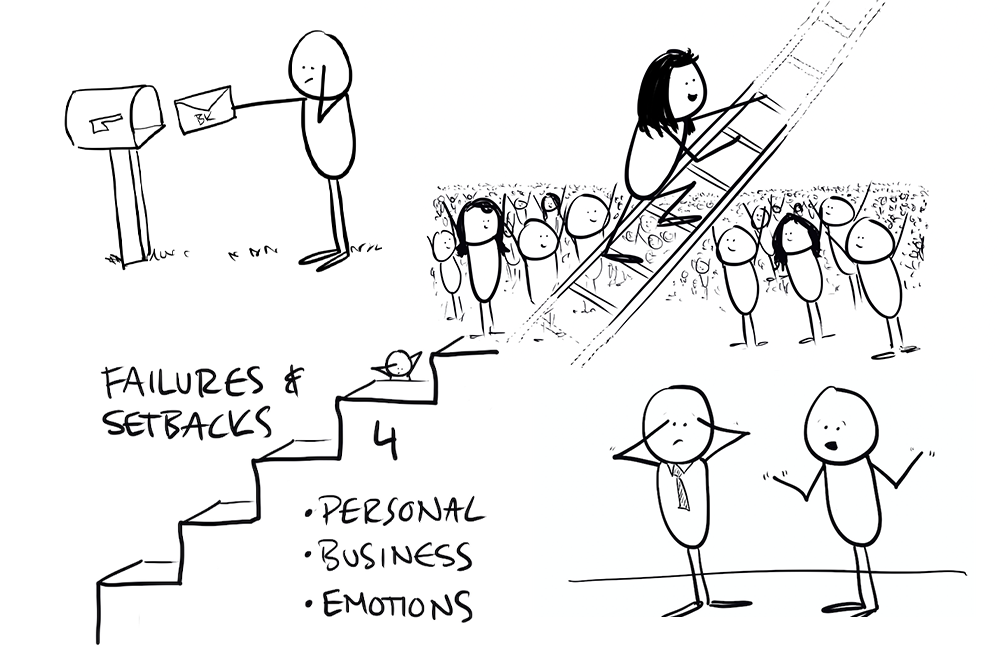Are you sharing your authenticity online? If not, the world is missing it.
One way to bring about quality conversations and boost your personal brand is to leverage exposure in your life. By exposure, I’m referring to the moments that don’t go quite right, aren’t perfect, or aren’t painless. Read on to learn about the 5 Levels of Exposure that you can use to connect with others. The levels increase in states of vulnerability, and Level 5 is what not to share.

And the best thing is that this strategy works online and offline—at home, work, or working from home.
I’ve included excerpts from my book, Ditch the Act, with several examples of these exposures, link to worksheets, and some tips at the end for overcoming fear and sharing.
Level 1 Exposures: The Things That Make You Human
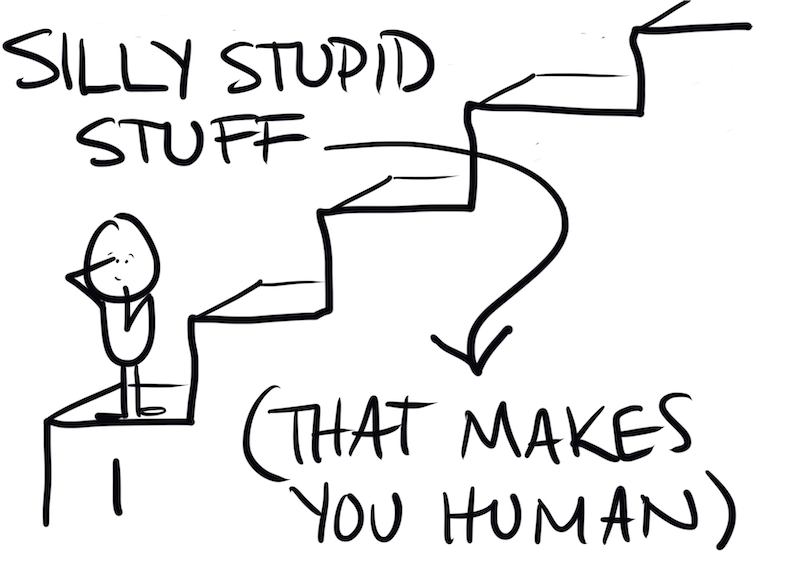
Level 1 Exposures are silly moments that show you are human.
Here are some examples. See how many you relate to, or have experienced.
- They’re the silly things you do (or don’t do:)
-
- Spilling water on yourself
- Forgetting to water your plants and having them die
- Forgetting to bring your wallet to the store
- Getting lost on a hike
- Things that impact your mood:
-
- Having a bad hair day
- Having a poor WiFi signal
- Going to the DMV
- Misplacing or losing your AirPods
- Embarrassing things that happen to you
You see, in 2015 when I started to get serious about wanting to build my personal brand around being a professional speaker, I thought that I should only post professional things that were about me speaking. But I was trying to establish myself as a speaker, and I didn’t have much to share. So that strategy couldn’t work. Eventually, I started sharing little moments of things that were not going right. And to my surprise, people started engaging with my posts. It was a struggle for me, but the more I opened up about little things not going right, the more interactions I would get. Those turned into conversations with people, and that helped to form relationships.
I thought social media was a place to showcase your “Highlight Reel,” because that is what I mostly saw from other people. But I have learned that when you show more than just the good, or what I now call the “Highlight R-E-A-L”, it allows people to get to know you, which could lead to them liking you, and then to ultimately trusting you.
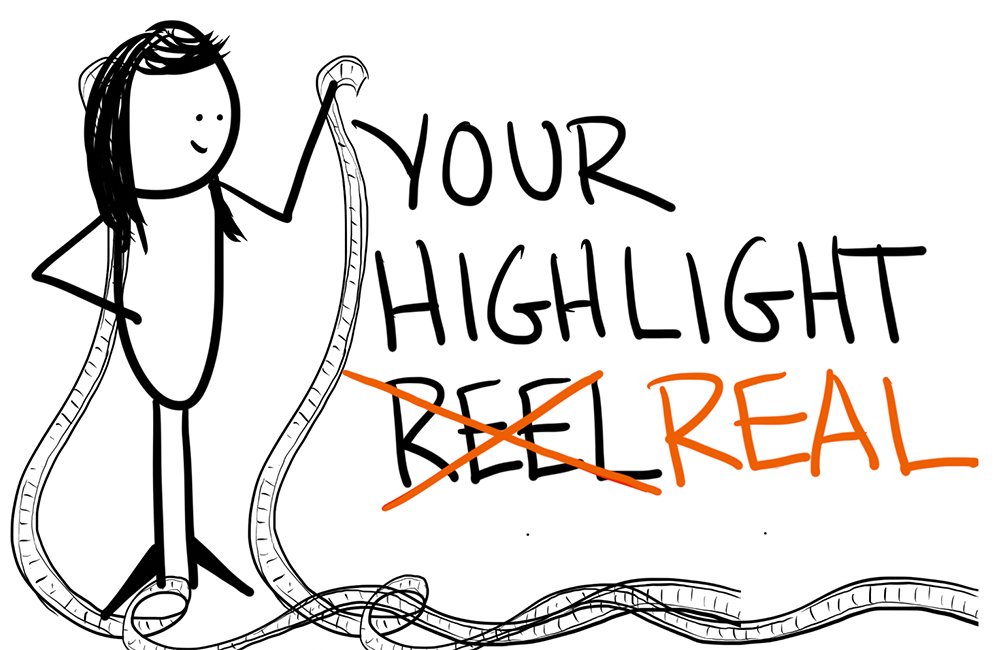
Now I get that sharing on social media is more of an extension of me, including the good, and the not-so-good that happens daily.
Looking back, I can see that it all happened by taking baby steps.
You know, starting small.
And once I started sharing, I realized that people didn’t think my posts about small mistakes were dumb, and they didn’t judge me. They actually gave advice, or would say, “that happened to me too!” Many shared similar stories with me, which triggered more conversations that helped us find common ground. I’ve written about losing one of my AirPods, and subsequent lessons learned. If you need convincing to try it, check out that blog!
Sharing things other than “the good” on social media and in person, actually helped me better connect with others.
Over time, I began to share things that I now call Level 2, then Level 3, and I gradually plucked up the courage to share my most vulnerable Level 4 exposures (none of it was easy).
Stress Before Going Onstage: The Viral Pimple Story
I gave a keynote in Santa Barbara —a big one. Imagine a three-camera shoot, hundreds of attendees, and a 100 ft. by 30 ft. big LED monitor that reached across the whole stage.

I freaked out because half an hour before my talk, I had a pimple crowning on my forehead.
Yes, a pimple.
I thought to myself, “Do I pop it or not, or not?
My instinct told me to text a friend, and I did.
Then that friend told me I should ask my Twitter followers. I was like “Whhaaa? No way!” Then after really thinking about it, I thought, “Why not? What do I have to lose? This is another chance to show a real moment I’m struggling with.”
You know what, I really didn’t know what to do!
Then my mind started racing again. I normally tweet about my articles, podcasts, media features, advice, insights, but not pimples. Wouldn’t people get weirded out? Would they think I was being unprofessional? After all, I had been tweeting all day at the conference, sharing highlights from other speakers.
Then it hit me. Sharing more than just “professional” tweets would show a bit of vulnerability, and would show that I was human. I realized that this was a Level 1 Exposure. I mean, we all get pimples at some point, right? And I was stressed about what to do, and felt like I needed advice from friends. And I consider my Twitter followers as friends, so I decided to give it a try.
I tweeted, “I’m about to go on stage and have a big pimple. I’m not sure what to do. Should I pop it or not?”
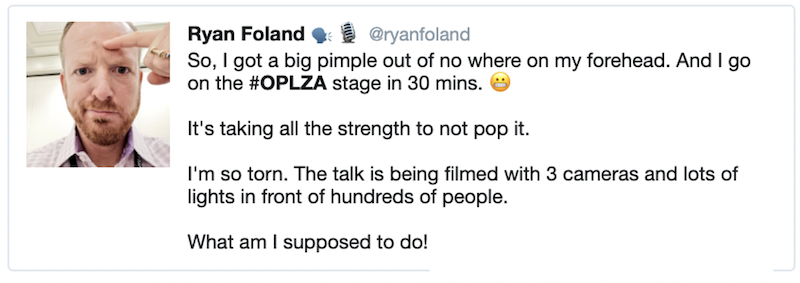
Apparently, people cared more than I thought they would.
This tweet blew up with hundreds of comments. I had team “pop it,” team “don’t pop it,” team “use concealer,” team “don’t even show up,” and team “run away.” I could hardly keep up with the advice and the GIFs!
I liked the concealer idea, so I had someone in the green room dab on a little concealer. I didn’t pop the pimple, but went on stage to see this tweet blown up on the ginormous monitor with everyone’s replies in real-time. Here is a selfie I took in in front of the huge LED screen that showcased my tweet and all the replies I saw as I got to the stage.
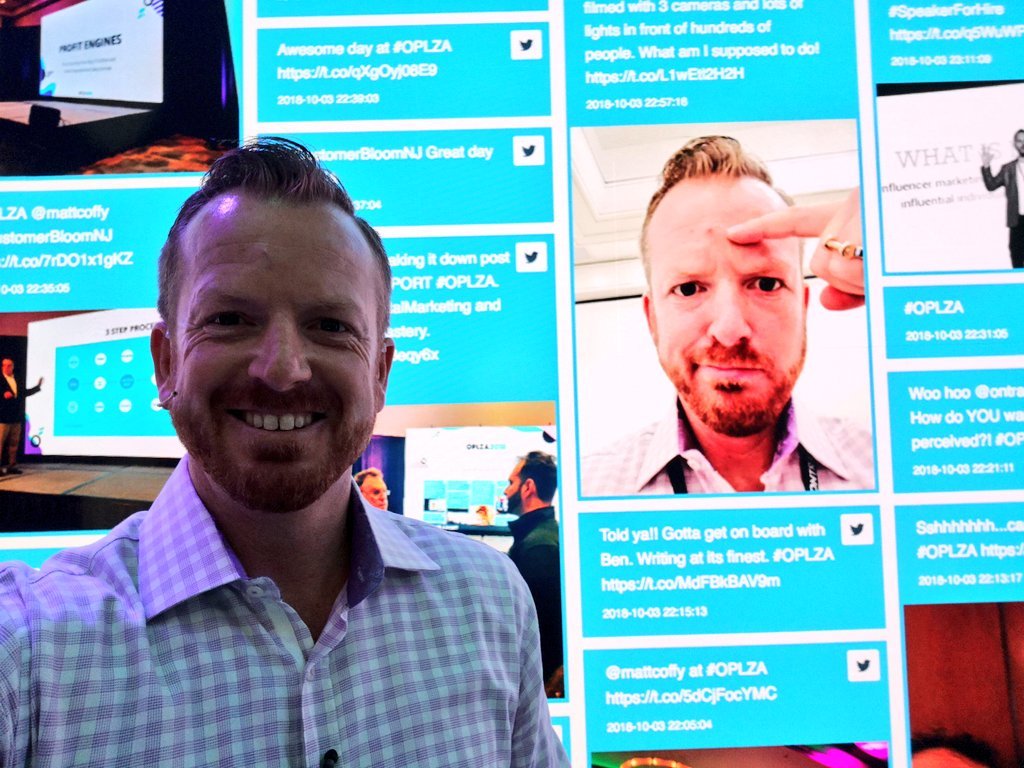
The word was out, and after I ran up onstage, I declared, “I have a pimple.” Everybody just went ruckus and I went more red than usual.
I was fearful for my life, that I would be judged by this zit. But because I put it out there, everybody wanted to help me out. The irony of it all was when one of the cameramen pulled me aside after the show and said, “The team saw the tweets Ryan, and we put on a special filter; you can’t even see the zit.” I gave him a special shout out on Twitter!
Over that four-day conference, I tweeted hundreds of times among thousands of tweets. My one tweet about having a pimple received the most engagement, impressions, and views during the entire conference! I ended up being the most engaged participant on Twitter from all those who tweeted. And as a result, I gained hundreds of followers and made a few more friends!
The next time that you have a zit, or something silly goes wrong, consider sharing it with the world. I know it is scary, but watch what happens when you do. People will engage and be there to support you. Tag me, and I’ll chirp in for sure!
Level 2 Exposures: Interactions with People and Things You Notice About How You Feel
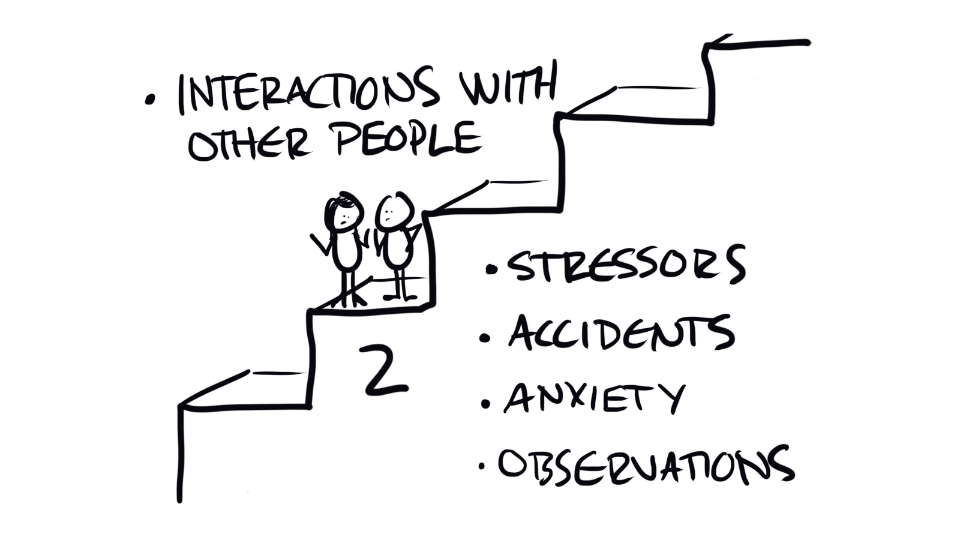
Once you get comfortable with sharing Level 1 Exposures, you can muster the courage to start sharing a little more, like interactions with others and things that stress you out. I call these or Level 2 Exposures. They feel harder to share at first, but the value of sharing is worth it!
Here are some examples. Have any of these things happened to you?
- Interactions with people:
- Getting in a fight with a coworker
- Missing someone’s birthday
- Things that are causing you stress:
-
- Having too many things on your plate
- Almost missing a flight
- Studying for finals
- Not feeling attractive enough to date
- Losing a loved one
- Being anxious about an important event for your job
Steering Dad to Safety – Then Telling My Boss
For the past 44 years, my family has had a unique tradition: taking part in the Huntington Beach Boat Parade in Huntington Harbor with our thousands of lights on the family “Butterfly Boat.” I had just gotten back from speaking in Ghana, and was so excited for this tradition, as I am every year. As a family we put up the lights together, and bring so much holiday cheer to everyone! Usually, my Dad is the official DJ, and he blasts Bruce Springsteen tracks over the speakers. Yep, more Bruce than Christmas music, but that is how we roll!
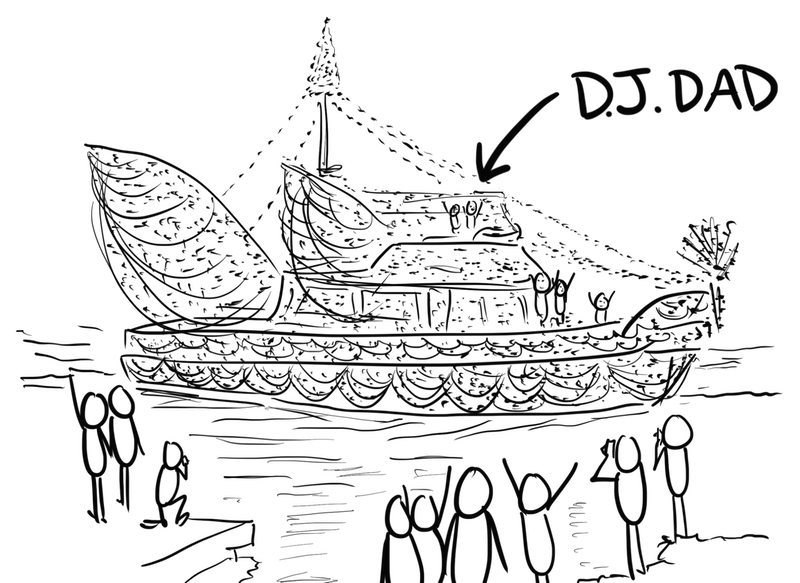
But last Christmas, about halfway through the parade, he stopped playing Bruce. This was odd. He plays “Born in the USA” on repeat, then some other Bruce tracks, but always finds his way back to “Born in the USA.” He is famous for it. When he stopped being the DJ, we all noticed and thought it was odd.
When we docked, my mom said, “You need to go check on your dad. He looked like he was walking really slow up the ramp.” I went to check on him, and to my horror, he was in bed, hurled over, grunting in excruciating pain. My heart sank and I lept into action. I rushed to get my family.
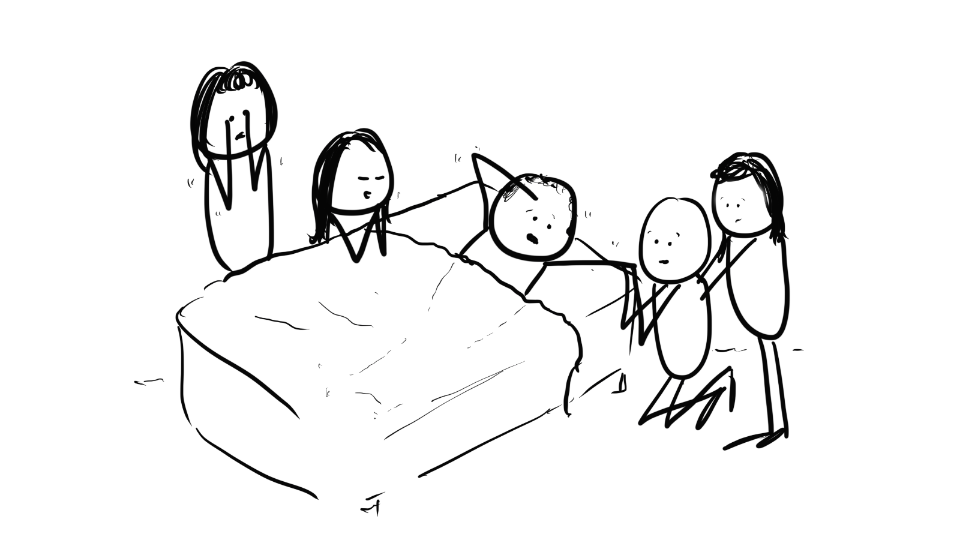
We didn’t know at the time that his intestines had herniated. It felt like we were literally watching my dad die. We were all crying, but still trying to be strong for him at that moment.
I said, “Dad, we are going to call 9-1-1, you need to go to the hospital.” He refused. He said, “No, no ambulance!”
Then he belted out in pain.
I asked if we could take him to the hospital, no ambulance.
After a couple more back and forths he finally let us take him.
I had to carry him into the car. When we arrived at the UCI Medical Center, they rushed him into emergency surgery. After a tense three hours, he came out, and three days later, he came home.
The first thing I did when I got to work the following Monday was to tell my boss what happened. I said, “I need you to know what’s going on.” He listened to me and said, “Ryan, I’m so sorry that happened and glad he is okay. I’m here for you, whatever you need. If you need to take the day off, no problem.”

Sharing with my boss was not easy, but was important. When you build real relationships with the people you work with, they can be there for you in times of need.
Do you think you could go to your boss and share a Level 3 Exposure? Unfortunately, many managers don’t build authentic relationships with their subordinates, and it hinders open and honest communication. But imagine if you had a boss that you didn’t share a Level 3 (or 4) Exposure with, and then he or she noticed that you were late to work, not in your normal mood or that your performance took a dive. They might attribute that lower performance to a lack of skills, or non-interest in doing the best work possible. However, the reality is that you were dealing with some very real stressors in your life (like your dad almost dying) that were distracting you from doing your best work.
My advice for you is to start small and show your human side with your boss (and co-workers)! Maybe if you’re having a hard time getting your kids to go to bed, that’s a Level 1 Exposure that could lead to a conversation you can have with your boss when he or she asks you how your weekend went. The idea is to try and open up a bit more, more often.
Then, once you’ve practiced sharing the smaller things, you will feel more confident building up to sharing Level 2 Exposures, like a conflict that you are having with a sibling, or a friend, and ask for advice. This helps your boss get to know you, the side that isn’t all work, and allows him or her to reciprocate his or her daily stressors. I recommend trying to build relationships at work that are based on mutual understanding of each other. And in order for that to happen, you have to go past the pleasantries, and share both ups and downs that you face.
(If you are a boss, try opening up to your employees, and earning their trust, by showing them that you are human too! That type of connection goes a long way.)
Over time, your boss may keep you top-of-mind for future promotions or opportunities based not just on your performance and skills, but because they’ve seen you handle tough situations outside of work.
Don’t be afraid to be honest and share life stressors with your boss! Remember, start small.
Level 3 Exposures: Challenges You Face, Things You’re Not Proud of, and Financial Issues
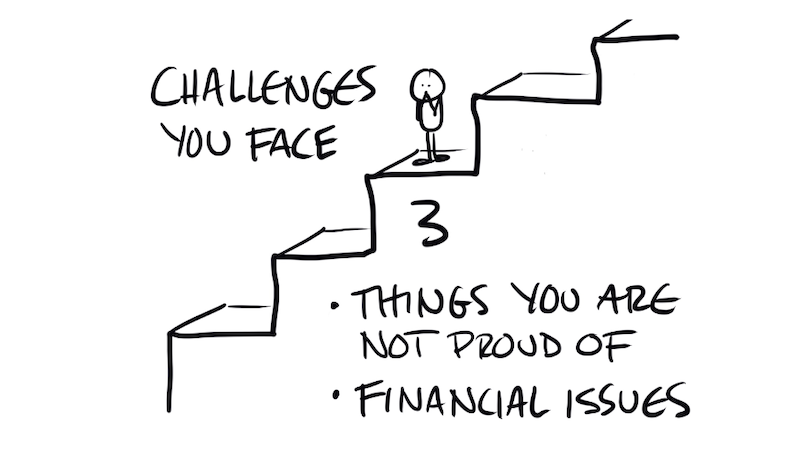 These are more serious exposures that are difficult to share. But, when you do share, you can help people get to know who you are as a person, by using these situations as examples to learn from.
These are more serious exposures that are difficult to share. But, when you do share, you can help people get to know who you are as a person, by using these situations as examples to learn from.
Here are some examples. Have you experienced any?
- Challenges you face:
-
- Leaving your company
- Breaking up with a business partner
- Losing a friend
- Having a problem at work
- Having to work when your friends have the night off
- Having to discipline your children
- Getting writer’s block
- Having unsupportive friends or family members
- Sexual preferences:
-
- Revealing your sexual identity
- Coming out of the closet
- Things you did or that happened that you are not proud of:
-
- Doing drugs (see Level 5)
- Dealing with lying in bed for two weeks straight because of low self-esteem
- Being bullied
- Being caught for a DUI or other related crimes
- Financial challenges:
-
- Not having money for gas
- Feeling overworked and underpaid
- Having too many expenses
- Losing your home
Writing a Book, and Losing a Business Partner

I’ve had my fair share of business failures. Particularly ones that involve ex-business partners.
Here is a real-life example of a Level 3 Exposure. People close to me in my life have been aware of this challenge I’ve been facing, but I only recently started sharing about it online.
Over the three-year process of selling the book concept for Ditch The Act to McGraw-Hill and actually writing it, I had the opportunity to deep dive into the concepts of the book—to be more human and not be afraid to be vulnerable.
It’s not easy to be vulnerable, but it’s the one thing that you must do to be successful in today’s world.
Being vulnerable is something I continue to practice on a daily basis; but while I was writing the book, I really learned to explore and listen to my feelings and emotions. I became more connected with myself, which helped me see what was really going on with my working relationship with my co-author and ex-business partner, Leonard Kim.
Leonard is an excellent writer who taught me a lot about how to push past my comfort zones to connect with others. But like starting a business, writing a book is intense, personal, and in this case, revealed major weaknesses in our working relationship. Through really living what we were writing, I was able to identify that I was not happy with the direction our partnership had taken. The negatives overshadowed the positives and I could not move forward if I was not honoring the principles of the book – so I chose to leave the company we built. And based on his behavior and his decisions of Level 5 Sharing, I also decided to end our friendship.
Months after I left the company and followed up with him about removing my likeness from the company website, he started yelling at me, then proceeded to send me over 300 text messages that were disturbing, threatening, and obscene. After that, I made no contact for months. All that being said, I reached a breaking point recently.
Someone reached out to me, asking if I still worked with Leonard and was a managing partner at InfluenceTree, I explained I left the company in 2019. They said that I was still featured on the InfluenceTree site, and it said I was an owner, and words were used like “our,” “we,” and “us.”
I verified, and, sure enough, Leonard was using my likeness on the website, almost a year after I left the company. In good faith, I assumed he would have removed me, but as of this writing, he has not done so entirely, which I deem both unethical and fraudulent.
The whole situation has taught me patience and has made me a stronger person.
It is more than disappointing; it is sad.
I think that people see the truth, and see past his phony use of my image in association with the company that he still runs. I can’t change his actions, his behavior, or his bullying of me, but I can control my reaction and attitude.
Through the process, I learned how to make tough decisions that honored who I was, even if it made me more vulnerable. I was concerned about the optics. I was concerned about how we would sell a book when our partnership did not work out. But after leaving InfluenceTree, in addition to working through the drama of leaving the company, I’ve been focused on my own brand and building my speaking and consulting business. I’ve been selling books, giving paid speeches, and taking on new clients. Looking back to where I was, I’m so much happier now. Leaving the relationship alleviated a lot of stress from my life. When I got real with myself, I realized I had to leave.
As I mentioned earlier, there are very real and negative impacts of sharing in the moment. It is always better to take time to process, reflect, and look for the lessons learned when things go wrong. If you share mid-crisis and don’t know what the outcome is, it can be unfair to people, because you are bringing them on an emotional rollercoaster. Instead, it is better to exit your personal emotional rollercoaster, then share in a way so that others can relate to your experience, and learn from how you handled it all.
Leaving a company I built over five years, and deciding to end my friendship and business relationship with Leonard was the “Mr. Toad’s Wild Ride” of an emotional rollercoaster for me. I decided to not share as it was happening pubically, so that things could calm down.
But finding out I was still on the website recently, I knew it was time to get vocal, and set the record straight.
I reached out to him again, asking that I be removed from the site, and tweeted these tweets to publicly to disclose the distance between him and me.

That seemed to get his attention, and he has since taken my likeness down on some parts of the site, but as of writing this, I am still on the website. I will keep working to remove my name and continue to distance myself from him, and my old company.
I still get anxious about promoting the book because of choices that he has made since I left InfluenceTree. But the reality is that I am true to myself and see my story as further proof of the fact that we are all just human.
It is natural to worry that people will judge you, but in ditching the act people will realize that you are more like them than they thought.
After posting this Level 3 Exposure, I have had a number of people reply to the tweet sharing their support, as well as a number of DMs, emails, and texts, with encouraging messages and similar stories of business partners gone bad, and it has connected us all that much more.
It felt good to receive supportive responses, and it verified that my actions were justified.
And the proof is in this reply to one of my tweets:
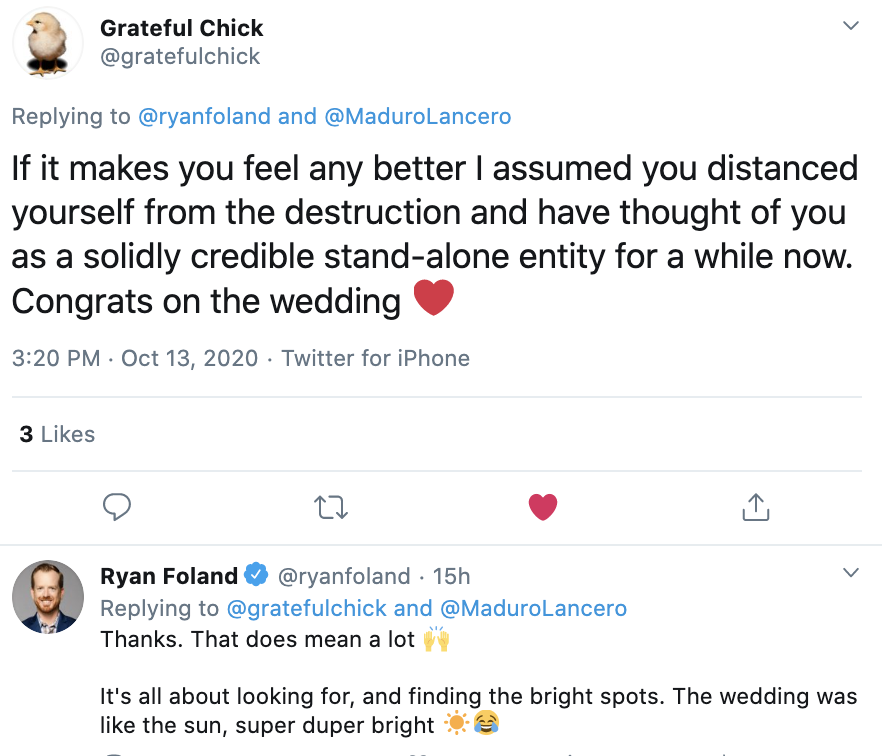
If you have ever had a friendship or a business relationship go sour, you can likely relate to the challenges I have been facing.
In fact, if you have a similar experience you need to get off your chest, I’d love to talk. Shoot me an email at ryan@ryanfoland.com. Or better yet, start to muster the strength to share it with your friends and maybe online followers. It might help inspire others who are in toxic relationships, helping them to get out before more damage to their business, happiness, or reputation is done.
Level 4 Exposures: Business and Personal Failures
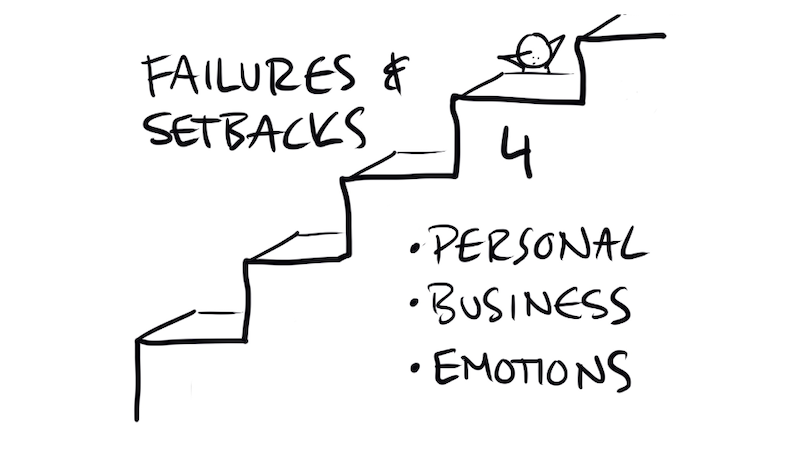
These are things you are extremely scared to share.
Here are some examples. Can you relate to any of these?
- Business failures:
-
- Having a failed business
- Being involved in litigation over a business you are involved with
- Personal setbacks:
- Becoming a single parent
- Losing a family member
- Being or formerly being homeless
- Being unemployed for longer than a year
- Emotions and feelings you are having:
-
- Having a failed marriage or long-term relationship
- Feeling like a failure
- Having depression or anxiety or another clinical diagnosis
- Dealing with disability
- Abuse:
-
- Being abused or sexually assaulted
- Being taken advantage of as a child
- Financial challenges:
-
- Filing for bankruptcy
- Having funding drop out
- Getting fired
- Struggling with poverty
I am far from perfect.
In fact, I’ve had to deal with the consequences of my actions, and had to learn humility the hard way.
After the financial market crash of 2008, I lost everything. My house was in foreclosure, lenders were trying to repossess my cars, I had maxed out all my credits cards, I started to drink a lot, and hit rock bottom. I was miserable and ashamed.
Broke and alone, I thought filing for bankruptcy was the answer. To keep the costs down, I hired the cheapest attorney I could find, and that meant that I had to file all the paperwork myself.
It was with a heavy heart that I put the envelope with my bankruptcy application into the mailbox and heard it land with a “thump” because it was so much paperwork. That day was one of the worst days of my life. I remember that I cried a lot.
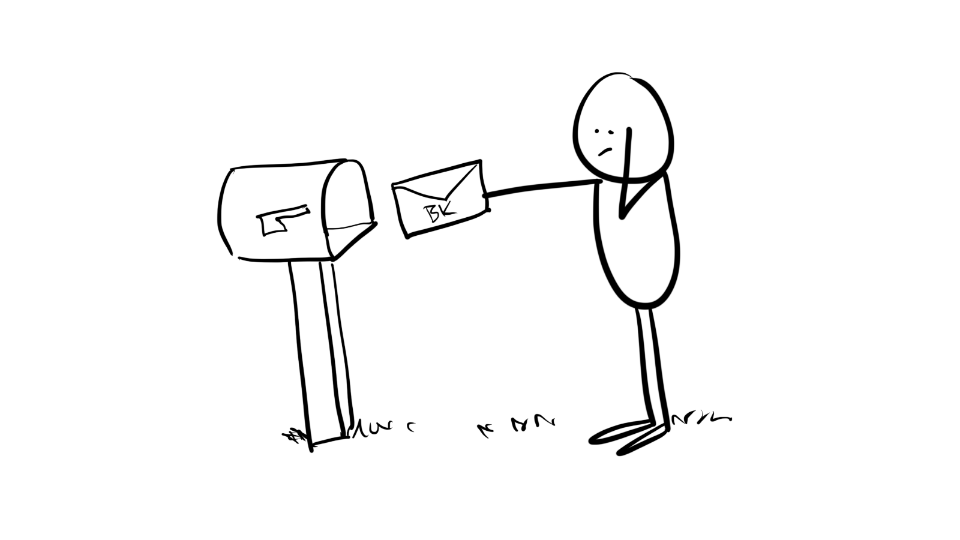
Two weeks later, by some miraculous act, when I checked my mail, saw my bankruptcy application. At first, I thought, “Gee, that was fast.” But then I looked closer to see the “return to sender” stamp.
I stared at it, and it took a while to figure out what happened.
My application paperwork was returned by mail because I was 32 cents short on postage.
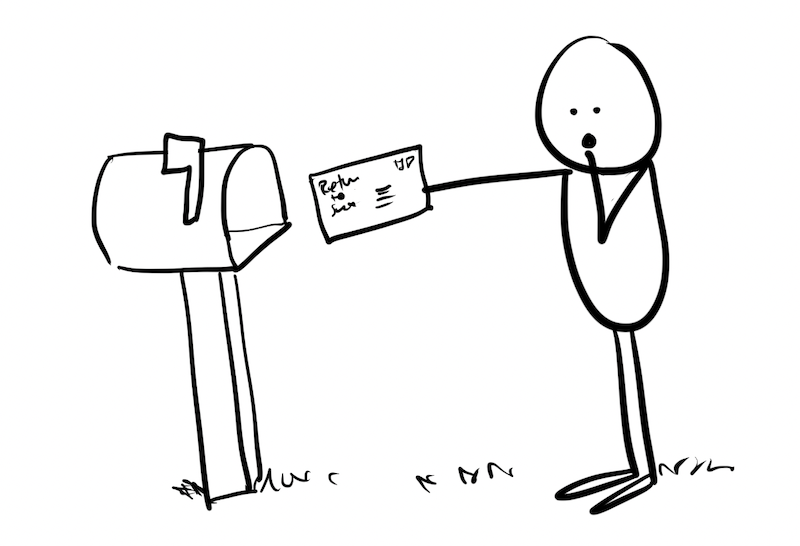
Woah.
After standing there, shocked, I realized it was a second chance to work my way out of the hole I was in.
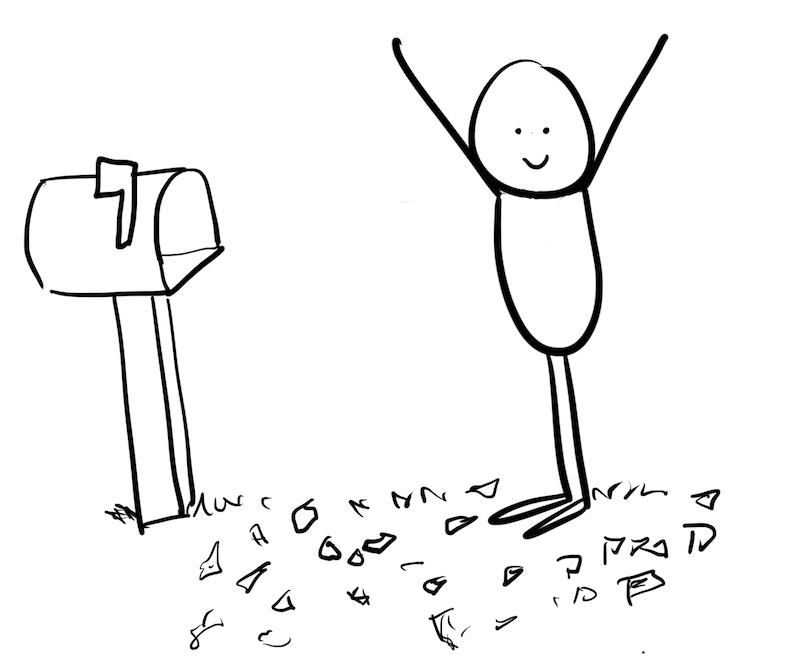 Then, I ripped up my returned bankruptcy application right then and there. At that moment, I took a deep breath, and I decided to turn my life around, without filing for bankruptcy.
Then, I ripped up my returned bankruptcy application right then and there. At that moment, I took a deep breath, and I decided to turn my life around, without filing for bankruptcy.
This story is one that I have shared in keynotes. It is an example of a Level 4 Exposure. I have had people come up after a talk, and thank me for sharing my story of financial challenges, as they have also experienced major setbacks. At that moment, it connects us with common experience. My personal challenges shared as exposures, show people in the moment, that even painful, vulnerable situations like this are an opportunity to become a better (and wiser) you.
Level 5 Exposures: When Sharing Goes Too Far—The DO NOT Share List!

Here are some examples of what NOT to share!
- Ego:
-
- Talking about how successful you are, the kind of fancy car you drive, the exotic toys you own
- (Extreme) Politics:
-
- Giving your views on politics, candidates, policies, international trade
- (Extreme) Religion:
-
- Talking about religion in general
- Promoting your religion to others
- Joining a satanic cult (or any cult really)
- Sex:
-
- Describing sexual or lewd acts you have either done, want to do, heard others doing, or fantasized about
- Sharing pictures or videos of body parts or pornographic content
- Making unwanted sexual advances
- Policies prohibited by your employer:
-
- Revealing trade secrets, disclosures, private data
- Things that could violate your employment agreement and get you fired (like doing drugs)
- Racist:
-
- Using discriminatory language verbally or in writing towards people of another race
- Supporting groups that encourage violence towards racial minorities, i.e. white supremacists
It is a free country and you can share anything you want. You have freedom of speech. This listed examples of topics are on my do not share list because they can be divisive, and it’s important to be aware of the possible risks involved in sharing extremes of anything. There are exceptions, like if your business is selling religious books, then sure, you should share accordingly. Also, if you are a politician, then you would be sharing things about politics. Use your own judgement, and do what works for you.
I’m just saying that knowing what not to share is just as important as knowing what to share. Be careful, because you are what you post, and the reality is that every post is a press release.
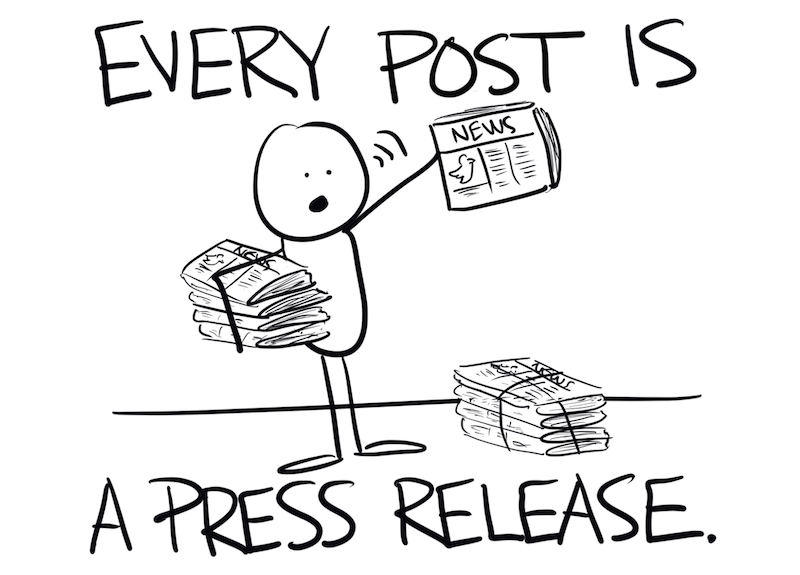
When you share things that will create divisions, or hate, or get you in trouble with your employer, it can end very badly.
Now, it’s your turn to overcome your fear and share!
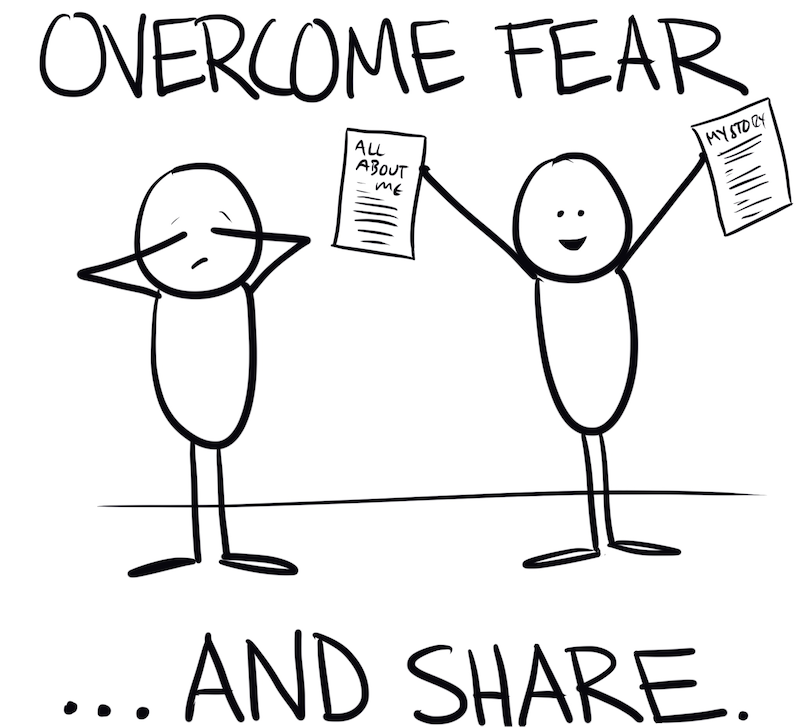
Sharing exposures for the first time is daunting. Believe me, I know! I’ve been grappling with sharing the messy, imperfect parts of my life for five years now.
But because I chose to share my struggles online, people saw me as human and it lets them get to know me. This allows people to decide if they like me, and if they do, then they might ultimately trust me. When you build a brand that is you, and people grow to trust you, you’ll have the foundation for relatability and authenticity. For a breakdown of all Exposure Levels, you can refer to this Exposure Level Worksheet from my book for more!
You can share, too, and be brave (see this worksheet from my book for examples) Start by sharing a Level 1 or Level 2 Exposure that is as small as a tweet. Here are a couple of Level 1 examples to get you started:
- “Don’t you just hate it when you type in a long password and have to do it again?”
- “Moved some apps on my phone and now I can’t find anything…”
And a couple of Level 2 examples:
- “Not going to lie. Considering taking a break from social media for awhile.”
- “It’s always difficult to forgive people who have done harm to me. Is that normal?”
In Conclusion: Your Success Is Half the Story
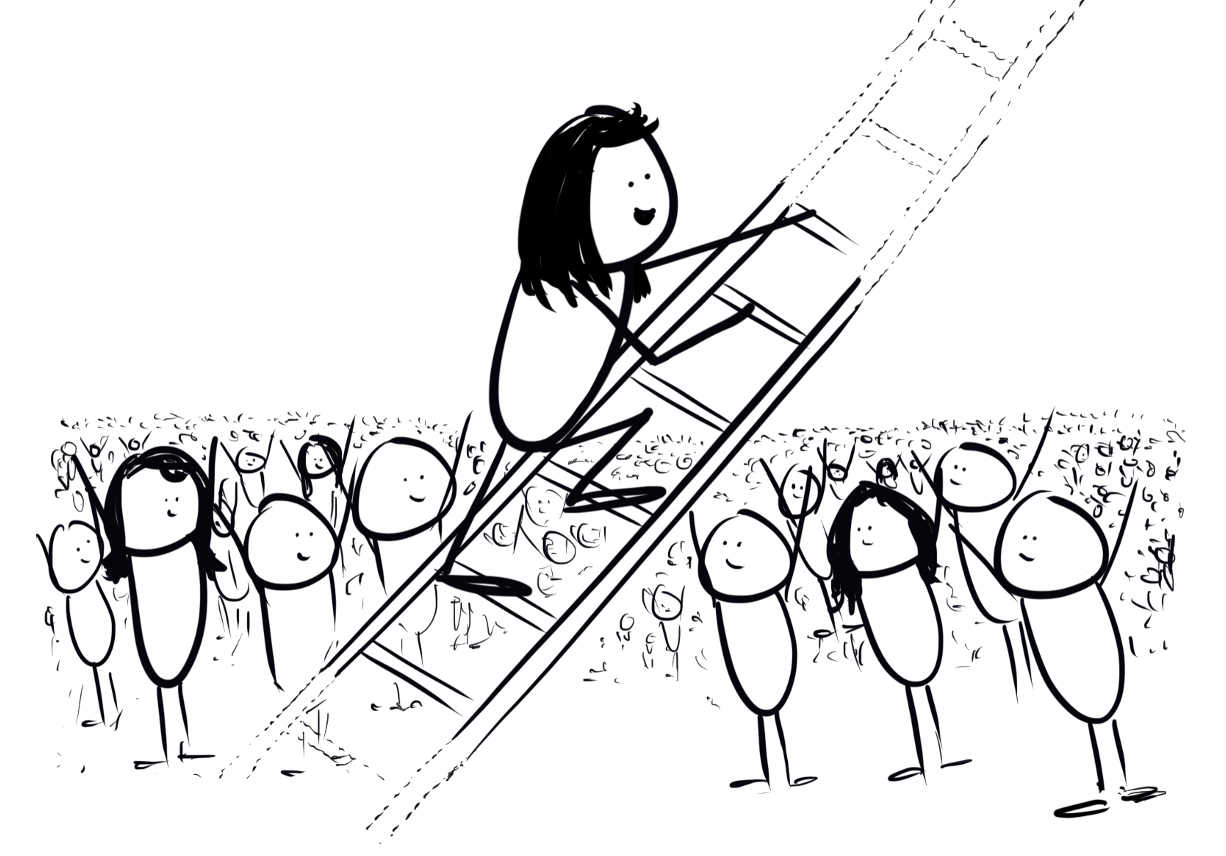
When you embrace your vulnerability and invite exposure into your brand, you can fortify your position in your market and gain a reputation that’s built on the truest version of yourself. Your authenticity will be the key that helps you attract more social media followers and become a sought-after expert in your field.
Commit to sharing good and happy stories alongside the stories that frighten you. Both are important because they reveal parts of who you are, how you navigate the world, and the outcomes of the choices you make. Your stories can offer others an authentic view into your world, and those glimpses of you are precisely what your audience is looking for.
If this article resonated with you, and you are interested in working with me, please visit my website to learn about my personal branding bootcamps. And if your company is looking for a high energy and dynamic speaker to give a virtual presentation about authenticity, I am your guy!
‘Til next time, see ya online!
This is a Contributor Post. Opinions expressed here are opinions of the Contributor. Influencive does not endorse or review brands mentioned; does not and cannot investigate relationships with brands, products, and people mentioned and is up to the Contributor to disclose. Contributors, amongst other accounts and articles may be professional fee-based.

